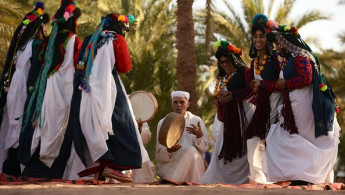Militant or sinner: Moroccans divided over drama series spotlighting female singers
A Moroccan Ramadan series has divided Moroccans over "the relevance" in spotlighting a character of the so-called "Shikha," a Moroccan female performer of popular music.
Broadcasted on state TV, the drama series titled "Al-Maktoub" tells the story of two Moroccan families in the context of class disparities and family conflicts.
Moroccan actress Dounia Boutazout plays the character of a performer of popular music; "Shikha" in the Moroccan dialect.
The stigma around the profession of "Shikha," which is usually linked to a carefree lifestyle, for decades has been used to vilify Morocco women who opt to pursue a career as popular music performers in a conservative society, where even the right to work by women is still hotly debated.
The series depicts the journey of Boutazou's character and her daughter in challenging the stigma and fighting to prove that they are worthy of respect and dignity within a judgemental environment.
The drama series is not to the liking of many Moroccans, particularly religious scholars.
In a seminar earlier this month, Yassine El Omari, a Moroccan scholar, attacked the series' concept. He accused the creators of "Al-Maktoub" of trying to "normalise" the concept of "Shikha" and aiming "to destroy the values of the Moroccan family."
Soon after, thousands of Moroccan users on Twitter tweeted their support and endorsement of the scholar's statement with the hashtag, "Yassine El Omari represents me".
Other Moroccan scholars have also joined El Omari's position against the series, with many blaming state TV for broadcasting such content during the holy month of Ramadan.
قال الامام الشعراوي رحمه الله" الهدي إلى الخير يغيظ أصحاب الشر" لهذا عندما قال الأستاذ #ياسين العمري رأيه في مسلسل الشيخه قامت الدنيا و لم تقعد
— r.naciri رضوان الناصيري🇲🇦🇵🇸🇲🇦 (@Radouan1390) April 25, 2022
#ياسين_العمري_يمثلني
Meanwhile, several Moroccan women's rights activists and intellectuals lambasted the scholar's "narrow-minded vision" that they argue intends to sabotage art and enforce a long-standing stereotype against "Shikha," who once battled oppression and the French colonisation in Morocco through their songs.
"Shikhat are the militants of the past and the present and it's our duty to value those historical militants artists for the future," wrote 7achak, a notorious digital feminist movement in Morocco.
For their part, another feminist NGO called Moroccan Outlaws criticised the scholar's "doublespeak" since they say he chose to go after an artistic concept while remaining silent about serious issues that trouble the Moroccan society, such as underage marriage.
Responding to the criticism, Najlae Mezyan, the scriptwriter behind the drama series "Al-Maktoub", told Moroccan media in a recent interview that the goal of the series was "to shed light on how the stereotype [of Shikha] could cage people in an inferior status in the Moroccan society."
It is believed that a "Shikha" used to roam among the Moroccan tribes during the colonial era as conveyed in "Al-Ayout" (popular poems) representing the achievements of the tribes to each other, encouraging motivation and determination against the coloniser.
The most famous "Shikha" in Moroccan history was Kharboucha, who was tortured and killed for standing against the tyranny of the governor of her tribe.
As Moroccan remain divided between those who support "Shikha" and those who stand with "Shaikh El Omari," the series continues to attract millions of views every day, making it the most-watched series in the history of Moroccan Television.





 Follow the Middle East's top stories in English at The New Arab on Google News
Follow the Middle East's top stories in English at The New Arab on Google News


